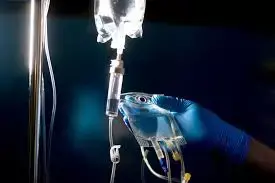- Home
- Medical news & Guidelines
- Anesthesiology
- Cardiology and CTVS
- Critical Care
- Dentistry
- Dermatology
- Diabetes and Endocrinology
- ENT
- Gastroenterology
- Medicine
- Nephrology
- Neurology
- Obstretics-Gynaecology
- Oncology
- Ophthalmology
- Orthopaedics
- Pediatrics-Neonatology
- Psychiatry
- Pulmonology
- Radiology
- Surgery
- Urology
- Laboratory Medicine
- Diet
- Nursing
- Paramedical
- Physiotherapy
- Health news
- Fact Check
- Bone Health Fact Check
- Brain Health Fact Check
- Cancer Related Fact Check
- Child Care Fact Check
- Dental and oral health fact check
- Diabetes and metabolic health fact check
- Diet and Nutrition Fact Check
- Eye and ENT Care Fact Check
- Fitness fact check
- Gut health fact check
- Heart health fact check
- Kidney health fact check
- Medical education fact check
- Men's health fact check
- Respiratory fact check
- Skin and hair care fact check
- Vaccine and Immunization fact check
- Women's health fact check
- AYUSH
- State News
- Andaman and Nicobar Islands
- Andhra Pradesh
- Arunachal Pradesh
- Assam
- Bihar
- Chandigarh
- Chattisgarh
- Dadra and Nagar Haveli
- Daman and Diu
- Delhi
- Goa
- Gujarat
- Haryana
- Himachal Pradesh
- Jammu & Kashmir
- Jharkhand
- Karnataka
- Kerala
- Ladakh
- Lakshadweep
- Madhya Pradesh
- Maharashtra
- Manipur
- Meghalaya
- Mizoram
- Nagaland
- Odisha
- Puducherry
- Punjab
- Rajasthan
- Sikkim
- Tamil Nadu
- Telangana
- Tripura
- Uttar Pradesh
- Uttrakhand
- West Bengal
- Medical Education
- Industry
Valproic acid safe and effective treatment for hyperactive delirium and agitation in patients with critical illness: Study

Valproic acid is a safe and effective treatment for hyperactive delirium and agitation in patients with critical illness suggests a study published in the Journal of Intensive Care Medicine.
Delirium and agitation are common syndromes in critically ill patients. Valproic acid (VPA) has shown benefit in intensive care unit (ICU)-associated delirium and agitation, but further evaluation is needed. The purpose of this study was to evaluate the effectiveness and safety of VPA for hyperactive delirium and agitation in critically ill adult patients. A retrospective cohort study at NYU Langone Health was conducted in critically ill patients treated with VPA for hyperactive delirium or agitation from October 1, 2017 to October 1, 2022.
The primary outcome was effectiveness of VPA, defined as a reduction in the total number of any concomitant psychoactive medication by day 3 of VPA treatment. Secondary outcomes included the effect of VPA on the doses of concomitant medications and adverse events.
Results: A total of 87 patients were included in the final analysis. By day 3 of VPA treatment, a 33% reduction (P < .001) in the total number of concomitant psychoactive medications was observed. VPA decreased the need for sedatives, as assessed by midazolam equivalents, but no significant changes were seen with dexmedetomidine alone, opioids, or antipsychotics. A 10 mg/kg loading dose was utilized in 36% of the cohort and its use decreased the risk for initiating additional psychoactive medications by day 3 of therapy (OR 2.8, 95% CI 1.0-7.8, P = .047), with benefits noted as early as 48 h after initiation.
Adverse events were low in the total cohort (10.3%). The addition of VPA to a complex pharmacologic regimen for hyperactive delirium and agitation is safe and can assist in the prevention of polypharmacy and overall workload in critically ill patients admitted primarily for cardiogenic shock and respiratory failure requiring mechanical ventilation.
Reference:
Nuti O, Merchan C, Ahuja T, Arnouk S, Papadopoulos J, Katz A. Valproic Acid for Hyperactive Delirium and Agitation in Critically Ill Patients. Journal of Intensive Care Medicine. 2024;0(0). doi:10.1177/08850666241302760
Dr. Shravani Dali has completed her BDS from Pravara institute of medical sciences, loni. Following which she extensively worked in the healthcare sector for 2+ years. She has been actively involved in writing blogs in field of health and wellness. Currently she is pursuing her Masters of public health-health administration from Tata institute of social sciences. She can be contacted at editorial@medicaldialogues.in.
Dr Kamal Kant Kohli-MBBS, DTCD- a chest specialist with more than 30 years of practice and a flair for writing clinical articles, Dr Kamal Kant Kohli joined Medical Dialogues as a Chief Editor of Medical News. Besides writing articles, as an editor, he proofreads and verifies all the medical content published on Medical Dialogues including those coming from journals, studies,medical conferences,guidelines etc. Email: drkohli@medicaldialogues.in. Contact no. 011-43720751


